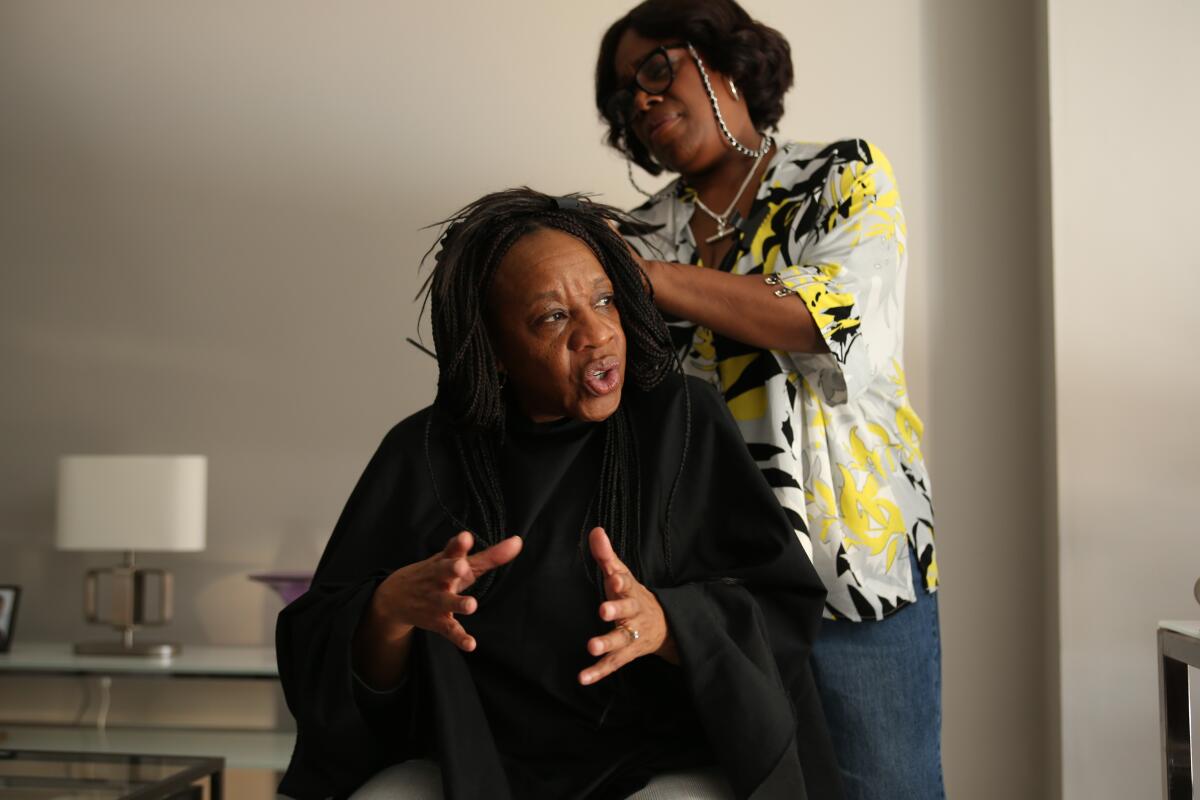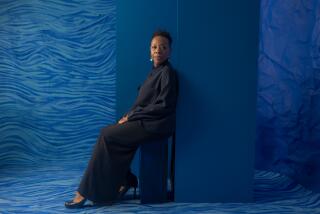Review: Duck and cover, here comes Mike Leigh’s punishing ‘Hard Truths’

- Share via
Mike Leigh’s “Hard Truths” invites you to spend an hour and a half with the most insufferable woman in the world. (If you personally know a worse one, my condolences.) That the unpleasantness turns out to be time well spent is a credit to Leigh’s curiosity about miserable jerks and the joy-sucking traps they set for themselves and others. In film after sardonically titled film, from “Bleak Moments” and “Naked” to “Happy-Go-Lucky,” his cranks suffer more than anyone because they’re stuck with a brain that simply won’t let them relax. Here, Pansy (Marianne Jean-Baptiste), a London housewife, goes to sleep frowning and wakes up screaming — her angst is solar-powered. When her mellower sister Chantelle (Michele Austin) asks why she can’t enjoy life, Pansy instinctively blurts, “I don’t know!”
As Pansy, Jean-Baptiste reteams with the director who got her a supporting Oscar nomination for 1996’s “Secrets & Lies” to deliver a performance that burns through the screen like a flamethrower. One of her first rants starts at the dinner table. It kicks off with a corker of a line — “Cheerful, grinning people, can’t stand ’em!” — and goes on to scorch everything on the block, from dogs in sweaters to baby clothes with pockets. Her tongue-lashing is hilarious, at least to us. Pansy’s husband, Curtley (David Webber), a plumber, and their 22-year-old browbeaten, layabout son, Moses (Tuwaine Barrett), chew in silence, petrified they’ll draw her ire. Pansy is such a miser that, for a moment, you wonder if she’ll be visited by three spirits. Then you realize Webber and Barrett are playing their parts as though she’s living with two ghosts already.
Something doesn’t have to be wrong in order for Pansy to make it seem so. She rages about their insipid little backyard as if it were a Dickensian cesspool; later, she accuses Curtley’s co-worker Virgil (Jonathan Livingstone) of being mute, but when we finally hang out with the lad, he never shuts up. Clearly, she’s the problem. But our own narrative need to understand her — to try to solve her anguish — makes us comb through her tirades looking for clues. We’re determined to decide where she (and our empathy) should fall on a scale from flat-out mean to mentally ill.
As we start to collect a list of Pansy’s triggers (elevators, germs, animals, lovely bouquets of flowers), her world does feel like a prison, an idea that the cinematographer, Dick Pope, underlines with a shot of her fearfully huffing up a set of stairs, her exhausted face peeking through the bars on the handrails as though she’s locked inside a cell. The score sustains single notes like a dirge as Leigh judiciously chooses which noises he’ll let barge into Pansy’s sterile life. One of his favorites is the sound of cooing pigeons — pests to some, but also survivors who’ve adapted to survive on crumbs of kindness. That theme extends to the movie too. Morsels of patience and generosity become life-giving sustenance, even if we cathartically prefer the scenes where strangers fire back at Pansy with both barrels.
Marianne Jean-Baptiste reunited with her ‘Secrets & Lies’ director to make the harrowing ‘Hard Truths.’ We spoke to them both about Leigh’s famous prep process.
Leigh doesn’t tend to tell stories where people go through a massive character arc. Instead, he’s constructed this movie like a quilt. Every scene is a comment on the art of complaining. This is, believe it or not, a pro-complaining film. Expressing our grievances properly can be a way of bonding, which Chantelle, a hairdresser, knows from the customers who come through her salon to share their heartbreaks and insecurities. The clients we enjoy chuckle at terrible things: infidelity, body shame, death. Pansy suffers legitimately terrible things too. Her aging body is all busted up with physical ailments. (“It hurts when I laugh,” she moans, although she’s yet to laugh at all.) Yet her chronic issue is that she complains gratuitously, stacking her gripes into a wall so that even the people who want to help — a doctor, a dentist — give up.
Chantelle has two adult children of her own; her cheerful daughters, Kayla (Ani Nelson) and Aleisha (Sophia Brown), come off as the healthiest people in the movie. Their relentlessly upbeat line deliveries will unnerve anyone who has played the role of the family mediator. But Leigh casts a tiny bit of judgment on them too. In one scene, the girls meet up at a bar to chat about their day, but he’s shown us that they’re both putting up a false front. The sisters’ soft and smiling phoniness is in sharp contrast to the film’s title. We might prefer their toxic positivity, but we can’t pretend it’s healthy.
Kayla and Aleisha are so different from listless, passive Moses that it’s astonishing they share some of the same genetic soil. As Leigh stitches together glimpses of their lives, the film gets us wondering how much of who we become is nature or nurture. I’m not entirely comfortable with the word “soul,” but it does seem like people come out of the womb open-hearted or closed. Parents — even Pansy — might only control whether they’ll make their child’s wiring worse than it already is.
We’ve mapped out 27 of the best movie theaters in L.A., from the TCL Chinese and the New Beverly to the Alamo Drafthouse and which AMC reigns in Burbank.
Most of the character names are either on-the-nose (Curtley, for a man who doesn’t speak) or ironic (Pansy, for a bulldozer who hates nature). Moses’ forceful-sounding full name — Moses Kingsley Deacon — hints at some of his mother’s disappointed hopes. As written, he’s a bit of an ungainly construction. I buy that Moses has withdrawn so deeply inside of himself that, at 6 foot 3, he barely seems to exist; however, there’s no way a kid this avoidant would leave a banana peel on his mother’s spotless kitchen counter. Doesn’t he know she’ll race up to his room in a fury?
Over the course of the film, we wrestle with how much sympathy to give him and Curtley. Yes, Pansy torments their days. But they’re also perfectly capable of moving out, or acknowledging her existence, or at least cooking their own dinner. The boundaries of personal responsibility cut through most of our excuses for their behavior; by the end, these grown men seem both abused and complicit.
The film can’t get to its gut punch of a final shot without a draggy closing stretch that tries our own patience. A few beats before, there’s a key scene where, shockingly, Pansy is so overcome that she falls silent. In my theater, the hushed tension spread from the screen to the seats. Everyone held their breath. And then, at Pansy’s most vulnerable moment, someone cackled, “Ha ha!” They’d fairly decided they’d had it with Pansy. Now that’s a hard truth.
'Hard Truths'
Rated: R, for language
Running time: 1 hour, 37 minutes
Playing: In wide release Friday, Jan. 10
More to Read
Only good movies
Get the Indie Focus newsletter, Mark Olsen's weekly guide to the world of cinema.
You may occasionally receive promotional content from the Los Angeles Times.













